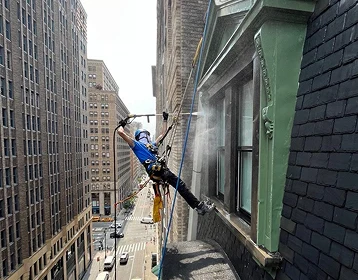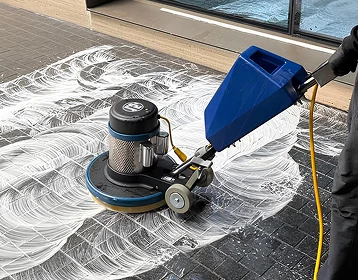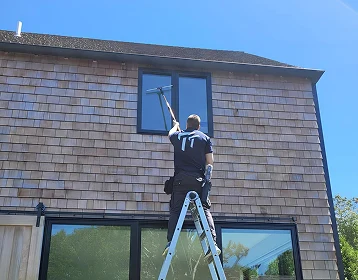A surprising number of people still believe old or inaccurate ideas about window cleaning. Some of these beliefs date back to the time when cleaning methods and products were very different from what we have today. Others have been repeated so often between neighbors, family members, or online discussions that they have taken on a life of their own. Over time, these myths become easy to accept without much thought and they can shape the way people care for their windows without realizing it.
The problem is that many of these assumptions can lead to cleaning methods that damage the glass or frames, make the work harder than it needs to be, or create results that do not last. Following bad advice might mean using the wrong tools, relying on outdated cleaning solutions, or choosing a schedule that leaves dirt and buildup in place for too long. This can shorten the lifespan of your windows and leave you with more costly repairs in the future.
Separating truth from fiction is an important step for anyone who wants to keep their windows in good condition. Clean, well-maintained glass can improve the light inside a room, protect the integrity of the frames, and even support energy efficiency by allowing sunlight to enter freely. Whether you are taking care of your own home or managing a commercial space, knowing what really works gives you the confidence to make smart choices. By understanding the facts, you can avoid wasting time on ineffective methods, protect your investment, and enjoy windows that look clear and perform well throughout the year.
Common myth windows need attention only in one season
Many homeowners and business operators still hold onto the idea that windows only require cleaning during springtime. But it does not match the reality of how windows accumulate dirt in a busy urban environment. The truth is that windows face challenges every season and their condition can change dramatically throughout the year. In summer dust, pollen, and pollution settle on glass surfaces, leaving behind layers of grime that dim natural light and cloud views. Fall brings leaves, bird droppings, and increased moisture, which can stain and accelerate wear. Winter exposes windows to road salt, freezing rain, and snow that may cause corrosion or streaks. Even the quieter spring months can involve pollen and rain that create stubborn deposits.
Ignoring these seasonal effects can result in windows that appear dull and neglected for long stretches, which affects both the appearance of your property and the longevity of the glass. When dirt and deposits build up over time, cleaning becomes more difficult and may require stronger chemicals or more intensive effort. This can lead to higher costs and increased risk of damage.
Adopting a regular cleaning schedule helps prevent heavy buildup and preserves the clarity of the glass. With periodic maintenance each cleaning session is more efficient and your windows maintain their fresh, bright appearance through every season. For businesses consistent window care is an essential part of upholding a professional and welcoming environment that attracts customers. For homeowners it means enjoying clear views and brighter interiors year-round.
Planning your window cleaning around seasonal challenges allows you to respond to specific needs as they arise. It also reduces the risk of surprises like stubborn stains or damage caused by prolonged exposure to weather and pollutants. Instead of waiting for spring, keeping your windows clean throughout the year offers a smarter, more cost-effective solution that protects your investment and enhances your space.
Rain doesn’t clean away the mess
There is belief that rain naturally washes windows clean and that no further attention is needed after a downpour. This idea seems logical, because rain is water falling from the sky, which should rinse away dirt. However, the reality is quite different, especially in a city environment where pollution and dust are always present.
When rain falls on windows, it can actually mix with particles like dirt, dust, and pollutants that settle on the glass. Instead of washing the windows clean, the rainwater often leaves behind spots and streaks caused by mineral deposits and grime. These marks can make windows look worse after the rain stops, reducing the clarity of the glass and blocking natural light.
In urban areas such as New York City, the situation is even more complex, because the rainwater carries pollutants from the atmosphere and roads. This combination leads to residue that clings stubbornly to windows. The buildup from repeated rain events can cause glass to look cloudy or dull and sometimes even accelerate damage if the residue is acidic or corrosive.
After it rains, windows benefit from professional regular cleaning to remove the accumulated deposits and restore their brightness. Regular cleaning is more effective than relying on nature to do the work and prevents the slow degradation of window surfaces. This type of maintenance ensures that your home or business windows remain clear, inviting, and protected against long-term wear caused by weather conditions.
By scheduling regular cleaning after rainy periods, you can avoid the frustration of unsightly spots and keep your windows in top condition year-round. Clean windows brighten interiors and maintain a positive impression for visitors or customers, no matter the weather.
The newspaper trick isn’t always the best fix
Many people grew up hearing that cleaning windows with a damp cloth followed by newspaper can make glass shine like new. This advice has been passed down for generations and often feels like a simple, effective household hack. The idea is that the newspaper absorbs moisture and polishes the glass without leaving streaks or lint.
While this method worked fairly well in the past, it no longer fits the demands of modern window care. Today’s windows often have special coatings or treatments that a newspaper might damage or fail to clean properly. Moreover, newspaper ink can sometimes leave smudges or transfer unwanted residue onto the glass, especially if the paper is not completely dry.
Another issue with using newspaper is that it may not remove stubborn dirt, mineral deposits, or oily films that accumulate on windows over time, especially in busy urban environments. These kinds of grime require stronger cleaning agents or professional equipment to fully eliminate without scratching or harming the surface.
Fortunately, modern alternatives offer safer and more effective results. Microfiber cloths combined with environmentally friendly cleaning solutions can clean windows thoroughly and gently. For larger or more complex jobs professional services like regular cleaning use specialized tools and techniques to restore glass clarity and remove buildup that household methods cannot address.
Relying on outdated tricks like newspaper may provide a quick shine, but often misses deeper cleaning needs and can cause frustration when spots or streaks reappear soon after. Investing in proper cleaning methods or professional help ensures that windows stay clear, protected, and visually appealing.
When “too expensive” isn't what it seems
Hiring professional window cleaners is often seen as something that will drain the budget faster than doing it yourself. The idea often comes from comparing the price of a service call with the cost of a bottle of glass cleaner and a cloth. At first glance the difference seems obvious and it can be tempting to conclude that professional help is a luxury rather than a necessity.
The real picture is more layered. The price of professional cleaning is influenced by several factors: the number of windows, their size, ease of access, the height of the building, and how often the service is scheduled. Some jobs require special safety equipment, while others can be done more simply. All these elements shape the final quote, so two properties of similar size might still have very different cleaning costs.
There is also the question of what the price includes. A professional team brings the right tools, eco-friendly cleaning solutions, safety gear, and the expertise to finish the work efficiently and without damage. This means fewer risks, no time spent climbing ladders, and no need to buy or store specialized equipment. In some cases, regular professional cleaning helps preserve window frames and glass, reducing the chance of costly repairs or replacements later.
When you consider the value of your own time and the potential cost of mistakes, the calculation changes. Professional cleaning can actually save money in the long run, especially for large properties or those in challenging locations. For a closer look at how DIY compares with hiring a team, including the hidden costs people often overlook, you can read more in this article.
The myth of harmful window cleaning products
Some people avoid cleaning their windows, because they believe the solutions used are harsh, toxic, or dangerous for people, pets, and plants. This concern is understandable, especially if you remember the strong-smelling chemicals of the past that left behind residues and caused skin irritation. The image of “window cleaner” for many still includes warning labels and ventilation requirements.
In reality, modern cleaning products have come a long way. Professional window cleaners today often choose biodegradable, non-toxic formulas that are just as effective as older chemical-heavy solutions, but are much safer for indoor use. These advanced cleaners remove dirt, grease, and mineral deposits without leaving harmful residues, making them suitable for environments like homes with children, pet-friendly spaces, and businesses with high customer traffic.
If safety is your priority, there are several steps you can take when selecting a cleaning product. Look for options labeled as biodegradable, plant-based, or ammonia-free. Avoid products with a strong chemical odor and always check the manufacturer’s information for any safety certifications. When hiring professionals, you can ask about the products they use and whether they meet eco-friendly standards. At Top Team window cleaning, we use solutions that are safe for people, pets, and plants while still delivering a streak-free shine.
If you want to learn more about our approach to sustainability and the steps we take to reduce environmental impact, you can visit our sustainability page. There you’ll find details about our product choices, water conservation methods, and other practices that keep both your windows and the planet in mind. Safe cleaning is possible and with the right products and professionals, it can be your new standard.
Clear facts and clearer views
Knowing the right way to care for your windows changes everything. When you understand which tools to use, which products are safe, and how to work with the right technique, cleaning becomes easier and the results last longer. Your windows stay free of streaks, frames are protected from wear, and the overall look of your space improves without unnecessary effort.
Reliable information also means you can avoid common mistakes that lead to damage or poor results. Using the wrong solutions, skipping regular maintenance, or cleaning in unsuitable weather can undo hours of work. When you have accurate guidance, every step, from the first wipe to the final polish, works toward a better finish.
At Top Team window cleaning, we share this practical knowledge every day through the way we work. Our team uses tested methods, professional-grade tools, and solutions that match the needs of each property, whether it’s a family home, a busy storefront, or a high-rise with challenging access. We treat every project with the same level of care, aiming for results that look good today and stay that way for as long as possible.
We invite you to explore how modern methods can work for your property. Ask us questions, find out what approach will suit your building best, and see how a professional touch can make a noticeable change.
You can get in touch with us for an estimate or a consultation and start planning your next cleaning with confidence.



